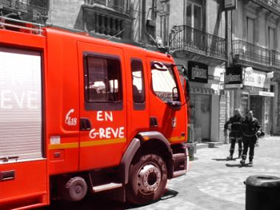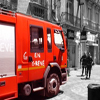 On September 11th, Nicolas Sarkozy awarded medals of honor to New York firefighters. This visit was perceived by many French firefighters as disconnected from the current situation in France. It’s been nearly two weeks since the red trucks have been covered with white inscriptions reading: “on strike.” The movement is followed by 90% of the personnel in Nice.
On September 11th, Nicolas Sarkozy awarded medals of honor to New York firefighters. This visit was perceived by many French firefighters as disconnected from the current situation in France. It’s been nearly two weeks since the red trucks have been covered with white inscriptions reading: “on strike.” The movement is followed by 90% of the personnel in Nice.
The issue that sparked tensions in the firehouses is a decree dated August 1st. On that day, the bonus of 16 index points (approximately 72 euros per month) that team leaders and equipment or group leaders were supposed to receive was removed. Furthermore, the senior non-commissioned officers who had already been receiving this bonus since 1991 saw it withdrawn as well. “This situation is experienced as an injustice,” explains Colonel Yves Cavalier from the Magnan fire station in Nice. “This bonus was applied to all local public functions and only removed from firefighters. It’s like being given something and then having it taken away immediately: their discontent is legitimate.” The bonus was removed due to pressure from the presidents of departmental services: they claimed they couldn’t afford to finance this bonus.
“Our profession has a specific budgetary regime, so it’s true that we already receive bonuses related to the function. But make no mistake: salaries are low,” confides a firefighter. “Personally, I am not asking for money but for recognition.” The word is spoken. The lack of recognition is the most expressed sentiment among firefighters. “Recognition that we already have in texts as we are recognized as exercising a high-risk profession,” explains a firefighter. “However, these texts are not linked to tangible things: my salary hasn’t increased, I don’t have the assurance of what will become of me if I get injured on the job. The injured are very poorly supported, assuming the administration even recognizes their injuries. In addition, there are disadvantages that come with the status of a dangerous profession: insurance premiums and life insurance increase, and credits are more difficult to obtain.”

The danger, or as some highlight, the arduousness of the job is the real core of the problem. Since 1999, the issue of full retirement at age 55 remains unresolved. The unions denounce the deadlock in negotiations. “Today, a 25-year-old firefighter will have to retire at 65,” notes a firefighter. “There’s no need to say that at that age, one’s physical condition is not at its best. Some deemed ‘unfit’ for work are reassigned to office jobs. For a man who has given 30 years of his life to save others, it’s very difficult to be discarded.”
For André Gorreti, federal president of the Autonomous Federation (the majority union in the A-M), “this issue with the index is the straw that broke the camel’s back.” The strike remains symbolic, as everyone continues to fulfill their missions. “These are responsible public servants,” assures Colonel Yves Cavalier. Following the call from several unions, a national demonstration is planned in Paris on September 25th, while the Superior Council of the local public service will hold a meeting. It’s this council that decides whether to validate the texts concerning firefighters. The following day, the National Conference of Fire and Rescue Services will take place. The unions hope their demonstration will “put pressure” on these meetings.
“In the eyes of everyone, we are heroes, warriors capable of enduring anything; yet, we also have our own limits. We are not whiners, but men who had promises broken to them,” laments one of these warriors.


